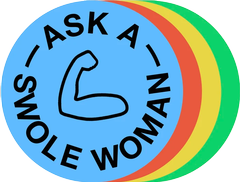Sick of clean eating, perfect gym outfits, and chiseled abs? A Swole Woman is here to help you be healthy, enjoy carbs, and get jacked.
Advertisement
The scenes stirring you are terrible: I saw one altercation in Chicago where police were attacking one man on the ground, trying to drag him away, and other protesters were trying to drag him back and away from them. We’ve seen police shove people so hard their heads smashed on the pavement. We’ve seen them throw innocent delivery cyclists on the ground for no goddamn reason, just because they were near a protest. You might be seeing this stuff and thinking: If I were there, and I were stronger, I could have done something about this.We’ve also seen protesters detained and kettled, sometimes for hours, not to mention that many protests have stretched for many hours and miles, leaving participants sore and stiff and exhausted. There’s no getting around that protesting is hard, but please don't be scared to do it, or get too in your head about the challenges; your presence and support is extremely needed right now. It’s possible to mitigate the negative effects a little bit if you treat it like the sport that it is, and I’ll get into that below.In terms of physical fighting, ACAB, I have to stress that it’s absolutely crucial right now to follow the lead of Black organizers and voices right now; if you’re a non-Black protester itching to throw hands, it would be wrong of you to just go ahead and do that when organizers and the prevailing voices are saying they want a non-violent protest. This doesn’t mean you can’t defend yourself in the right situation, or try to defend or protect others who are being physically threatened or harassed, but our goal should be to respect the leadership of Black people.
Advertisement
It’s hard to say how meaningful physical training can actually be when protesters are aiming to be non-violent and police are armed with lethal weapons. Any strength or capability you physically have is not going to be the difference between winning and losing in that situation. I’m not trying to get you a “resisting arrest” charge. While in some cases you’re allowed to defend against unlawful force from a police officer, it’s legally tricky, and in the moment, things can escalate so fast that you might be doing it at pretty great personal risk.That being said! Police aren’t the only antagonists at protests; sometimes there are white supremacists, NIMBYers, All Lives Matter-ers, etc. from whom defending yourself and others is at least more of a gray area. There’s also the option of simply “running away,” which will only get easier with some training. I’m going to assume you’re using your best judgment and following leadership in any physical protest-related pursuits, and/or accepting the consequences of your actions.I definitely share your secret fantasy (mostly detached from reality) that being in good physical shape will enable me in disaster scenarios. I have many friends who are fully committed to packing it in immediately in an apocalypse, but not me; I’m going to run, fight, lift I-beams off of those friends who are ready to die when they’re caught in rubble, and carry them to safety, forcing them to live another day with me.Do you have a question about working out, eating, health, or why you shouldn't be afraid of lifting heavy weights? Send it to swole.woman@vice.com and follow @swolewoman on Instagram.
Advertisement
Being stronger from lifting weights does make a lot of daily life stuff easier, but it also really helps in those infrequent yet inevitably recurring times when you realize you aren’t as in shape as you wish you were. When a heavy piece of furniture gets delivered downstairs and it’s going to live on the second floor, or you’re running to catch a train but can’t make it up the stairs fast enough, you curse your lack of preparedness and vow you’ll start going to the gym more, don’t you? I know you do. What better time to fix that than right now?So: My first plug would be for being generally a) as jacked as you can stand, which you’d get from lifting heavy weights, as heavy as you can manage with good form. You can’t effectively push away an attacker or pull a fellow protester to safety, or hey, if it’s your thing, throw a punch at a Nazi, without doing the pushes and pulls of lifting weights first.And you might think this is all about your arm muscles, but one reason I love lifting is that your whole body is systems of muscles designed to work together, and you can train them that way with pretty simple compound movements. If you picture, for instance, trying to drag a sandbag across the ground, someone who can stabilize themselves with their legs and hips and back is going to be a lot more effective than someone who just does a lot of curls. Will this make you a perfect first responder/bodyguard/defender of the people? No, obviously not; but if you’ve never done it before, it lays the groundwork for everything else you might want to do. With a lot of gyms still closed, it’s hard to do quality training right now, but you can start here. If life ever goes back to normal and you can access gym equipment, you can start with a basic strength training program.
Advertisement
My b) plug is for being conditioned, by doing some cardio-type work (which I’m normally down on, but mostly only as a main form of exercise. In disaster situations, it always comes in handy). For cardio training, your approach should be slowly working up to long distances and faster times. Couch to 5K is the thing most like what I did when I got into running, and provides an extremely gentle on-ramp to physical activity.In the longer term, there’s a lot to be said for being conditioned for sustained physical activity. A couple of guides for journalists covering protests even specify “good physical shape,” when we’re talking about running away from violent tactical weapons like flash-bangs, sound cannons, tear gas, or rubber bullets (all of which have been present at these protests). While you seem like you’d like to be a hero, and I also clearly want to be a hero and support your hero tendencies in the abstract, those are not the times to be a hero; they are the times to put some ground between yourself and the dangerous paramilitary weapons.Self-defense skills could come in handy here. Unfortunately, due to the absolutely crack timing of the pandemic, you will probably have a hard time finding a self-defense class right now (even a socially distanced one probably wouldn’t be super helpful, since the moves involve touching). But there are tons of videos online showing basic moves, and trying to practice them with a partner, roommate, or family member would be better than nothing. You can only be better at this stuff by generally being strong. Here are a couple of videos I thought were nice:
Advertisement
How to prepare for a protest: the basics
You can read past Ask A Swole Woman columns at The Hairpin and at SELF and follow A Swole Woman on Instagram. Got a question for her? Email swole.woman@vice.com .

